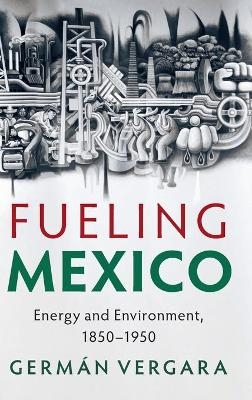
Fueling Mexico
Energy and Environment, 1850–1950
Seiten
2021
Cambridge University Press (Verlag)
978-1-108-83127-7 (ISBN)
Cambridge University Press (Verlag)
978-1-108-83127-7 (ISBN)
Germán Vergara explains how, when, and why fossil fuels became the basis of Mexican society, comparing Mexico's fossil transition with those of other countries. The transition from a solar energy regime to one dependent on fossil fuels transformed Mexico's economy, politics, and culture - with serious environmental and social consequences.
Around the 1830s, parts of Mexico began industrializing using water and wood. By the 1880s, this model faced a growing energy and ecological bottleneck. By the 1950s, fossil fuels powered most of Mexico's economy and society. Looking to the north and across the Atlantic, late nineteenth-century officials and elites concluded that fossil fuels would solve Mexico's energy problem and Mexican industry began introducing coal. But limited domestic deposits and high costs meant that coal never became king in Mexico. Oil instead became the favored fuel for manufacture, transport, and electricity generation. This shift, however, created a paradox of perennial scarcity amidst energy abundance: every new influx of fossil energy led to increased demand. Germán Vergara shows how the decision to power the country's economy with fossil fuels locked Mexico in a cycle of endless, fossil-fueled growth - with serious environmental and social consequences.
Around the 1830s, parts of Mexico began industrializing using water and wood. By the 1880s, this model faced a growing energy and ecological bottleneck. By the 1950s, fossil fuels powered most of Mexico's economy and society. Looking to the north and across the Atlantic, late nineteenth-century officials and elites concluded that fossil fuels would solve Mexico's energy problem and Mexican industry began introducing coal. But limited domestic deposits and high costs meant that coal never became king in Mexico. Oil instead became the favored fuel for manufacture, transport, and electricity generation. This shift, however, created a paradox of perennial scarcity amidst energy abundance: every new influx of fossil energy led to increased demand. Germán Vergara shows how the decision to power the country's economy with fossil fuels locked Mexico in a cycle of endless, fossil-fueled growth - with serious environmental and social consequences.
Germán Vergara is Assistant Professor of History at the Georgia Institute of Technology.
1. Introduction: Energy, environment, and history; 2. 1850s: Solar society; 3. The nature of growth; 4. Searching for rocks; 5. The other revolution; 6. 1950s: Fossil-fueled society; Conclusion; Index.
| Erscheinungsdatum | 18.06.2021 |
|---|---|
| Reihe/Serie | Studies in Environment and History |
| Zusatzinfo | Worked examples or Exercises |
| Verlagsort | Cambridge |
| Sprache | englisch |
| Maße | 157 x 235 mm |
| Gewicht | 650 g |
| Themenwelt | Geisteswissenschaften ► Geschichte ► Regional- / Ländergeschichte |
| Geschichte ► Teilgebiete der Geschichte ► Wirtschaftsgeschichte | |
| Naturwissenschaften ► Biologie ► Ökologie / Naturschutz | |
| Sozialwissenschaften | |
| Wirtschaft ► Volkswirtschaftslehre | |
| ISBN-10 | 1-108-83127-3 / 1108831273 |
| ISBN-13 | 978-1-108-83127-7 / 9781108831277 |
| Zustand | Neuware |
| Haben Sie eine Frage zum Produkt? |
Mehr entdecken
aus dem Bereich
aus dem Bereich


